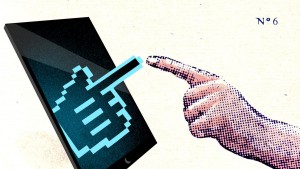 This is a big question with a multitude of answers. NPR’s new program/podcast Invisibilia answers with three stories. The first one looks at the big picture with questions about artificial intelligence, wearable computers, and the possibilities for human/computer co-evolution. The other two stories look at specific, personal, right-now examples of human character changes as a result of digital technology.
This is a big question with a multitude of answers. NPR’s new program/podcast Invisibilia answers with three stories. The first one looks at the big picture with questions about artificial intelligence, wearable computers, and the possibilities for human/computer co-evolution. The other two stories look at specific, personal, right-now examples of human character changes as a result of digital technology.
npr.org/programs/invisibilia/385792677/our-computers-ourselves
Tag: psychology
In the ongoing debate about the impact of video games on the human brain, emotional arguments are seldom grounded in solid research. In this TED talk, Daphne Bavelier claims that current research contradicts many common-sense beliefs about the psychological impact of fast-paced gaming. The research is still in the early stages; after all, computer gaming is a relatively new human activity. And there remain questions about violence, addiction, and other big issues. But the research described here is a small step toward understanding how what we do changes who we are.
http://www.ted.com/talks/daphne_bavelier_your_brain_on_video_games.html
Most of us inhabit two worlds: the analog world where our physical bodies live and the digital world where our minds spend hours every day. As our digital reality demands more and more of our time and attention, how do our brains change? This sobering Newsweek article summarizes the latest research about the impact of the Internet on the human brain. After you read it, you may want to switch off your smart phone and go for a walk with a friend in the woods….
thedailybeast.com/newsweek/2012/07/08/is-the-internet-making-us-crazy-what-the-new-research-says.html
It’s generally wise to understand the tools and tricks that people and institutions use to manipulate our behavior. This Wired article is packed with insights into how everybody from Amazon to Zynga gets you to spend more time and money at their sites.
wired.com/magazine/2011/06/ff_gamed/all/1